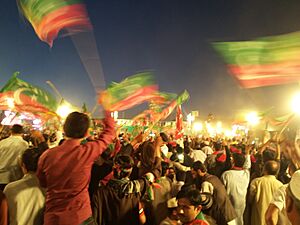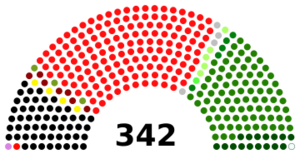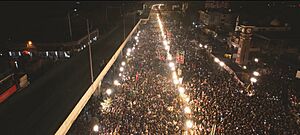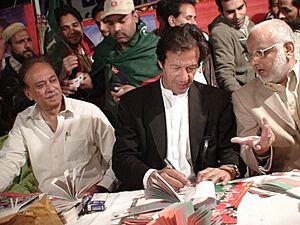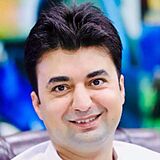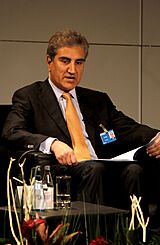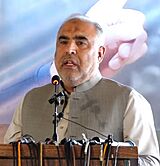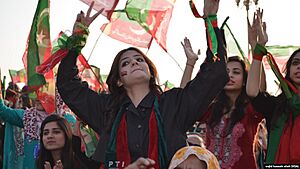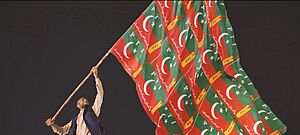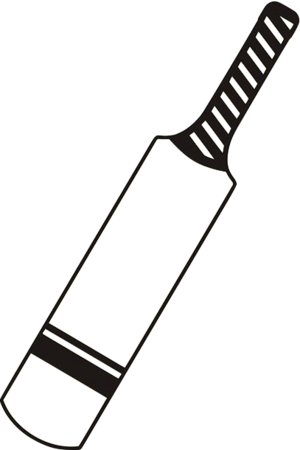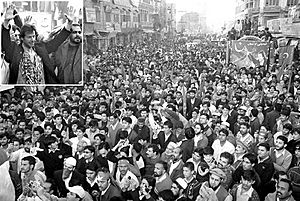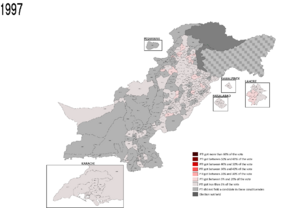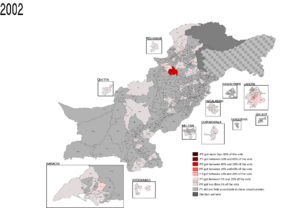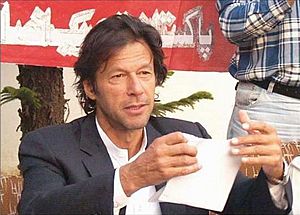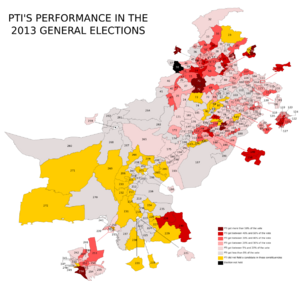Pakistan Tehreek-e-Insaf facts for kids
Quick facts for kids
Pakistan Tehreek-e-Insaf
پاکستان تحريکِ انصاف
Pakistan Movement for Justice |
|
|---|---|
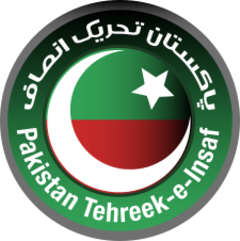 |
|
| Abbreviation | PTI |
| President | Parvez Elahi |
| Chairman | Gohar Ali Khan |
| Secretary-General | Salman Akram Raja |
| Spokesperson | Sheikh Waqas Akram |
| Vice Chairman | Shah Mahmood Qureshi |
| Leader in Senate | Shibli Faraz |
| Leader in National Assembly | Omar Ayub Khan |
| Founder | Imran Khan |
| Founded | 25 April 1996 |
| Headquarters | Sector G-6/4 Islamabad-44000, ICT |
| Student wing | Insaf Student Federation |
| Youth wing | Insaf Youth Wing |
| Women's wing | Insaf Women Wing |
| Research Wing | Insaf Research Wing |
| Membership (2012) | 10 million |
| Ideology |
|
| Political position | Centre to centre-right |
| National affiliation | Tehreek Tahafuz Ayin |
| Colors | |
| Slogan | Change the system—change Pakistan |
| Senate |
22 / 96
|
| National Assembly |
0 / 336
|
| Punjab Assembly |
28 / 371
|
| Sindh Assembly |
5 / 168
|
| KPK Assembly |
0 / 145
|
| Balochistan Assembly |
0 / 65
|
| GB Assembly |
21 / 33
|
| AJK Assembly |
31 / 53
|
| Party flag | |
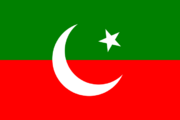 |
|
The Pakistan Tehreek-e-Insaf (PTI) is a political party in Pakistan. It was started in 1996 by Imran Khan, a famous cricketer who later became Pakistan's prime minister from 2018 to 2022. Today, Gohar Ali Khan leads the party. PTI is one of the three main political parties in Pakistan, along with the Pakistan Muslim League–Nawaz (PML–N) and the Pakistan People's Party (PPP).
When it first started, PTI did not win many elections. In 1997 and 2002, only Imran Khan himself won a seat. From 1999 to 2007, PTI supported General Pervez Musharraf's presidency. Later, in 2007, they opposed Musharraf and did not take part in the 2008 elections. They believed the elections were not fair.
Around 2012, PTI became very popular. It had over 10 million members in Pakistan. Many people who used to support the PPP started supporting PTI, especially in Punjab and Khyber Pakhtunkhwa. This was because PTI focused on ideas that appealed to many ordinary people.
In the 2013 elections, PTI became a major party. It received the second-highest number of votes and the third-highest number of seats. They even formed the government in the province of Khyber Pakhtunkhwa. While in opposition, PTI held many rallies with slogans like "Change is Coming."
In the 2018 elections, PTI received the most votes ever for a political party in Pakistan. They won the most seats in the National Assembly of Pakistan. For the first time, PTI formed the national government with other parties, and Imran Khan became the prime minister. However, in April 2022, Imran Khan and his government were removed from office after a vote of no-confidence. After the 2024 elections, PTI-backed candidates joined the Sunni Ittehad Council (SIC). As SIC, they now lead the government in Khyber Pakhtunkhwa and are the main opposition party in Punjab.
PTI says it wants to make Pakistan a welfare state, which means a country that takes care of its people's well-being. They also want to end unfair treatment against minorities. PTI calls itself a movement for change, aiming for a democracy based on fairness and equality. They say they are different from other major parties because they are not led by one family.
Since 2019, some people have criticized PTI for not solving economic problems, especially during the COVID-19 pandemic. However, Imran Khan's government was later praised for helping the country recover from the pandemic. During their time in power, the party also faced criticism for how it handled the opposition and for limiting media freedom.
After some protests on May 9, 2023, many PTI leaders were arrested or resigned. The government said this was needed because of violence and damage caused by PTI supporters. PTI, however, said these claims were false. On December 2, 2023, Gohar Ali Khan was chosen as the new chairman of PTI. Imran Khan himself nominated him for this role.
Contents
How the Party Started
Early Days and Growth
The Pakistan Tehreek-e-Insaf was started by Imran Khan on April 25, 1996, in Lahore. It began as a social and political group. In June 1996, the first main committee of PTI was formed with Imran Khan and other founding members. At first, PTI grew slowly and was not immediately popular.
After Benazir Bhutto was assassinated in 2007 and Nawaz Sharif returned to Pakistan, there was more pressure on President Musharraf to hold elections. PTI joined other parties that were against military rule. PTI did not take part in the 2008 elections. They believed the elections were unfair. In late 2008, about 150,000 people joined the party.
Becoming a Major Opposition Party
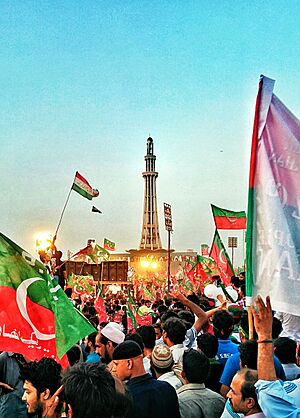
PTI became a big party in the 2013 Pakistani general election. In the years that followed, they spoke out against the government on many issues. PTI became the main opposition party in Punjab and Sindh. Imran Khan became the party's leader in parliament.
PTI won the elections in Khyber Pakhtunkhwa province, which had been affected by violence. They formed the provincial government there. The PTI-led government in Khyber Pakhtunkhwa worked on projects to build dams. These dams aimed to stop floods and provide electricity to remote areas. They also made changes to healthcare, like offering health insurance for poor people. The Chief Minister, Pervez Khattak, even visited hospitals to check on staff and remove those who were not doing their jobs well.
In November 2013, Imran Khan asked Chief Minister Pervez Khattak to remove two ministers from the Qaumi Watan Party (QWP) because of corruption claims. This ended PTI's alliance with QWP.
In May 2014, PTI claimed that the 2013 elections were rigged. On August 14, 2014, Imran Khan led a large rally from Lahore to Islamabad. They demanded that Prime Minister Nawaz Sharif resign and that the election fraud claims be investigated. Protesters entered Islamabad and marched into a high-security area. On September 1, 2014, some protesters tried to enter the Prime Minister's house, which led to violence. Three people died and many were injured.
In 2017, Imran Khan and his ally Sheikh Rasheed filed a case about the Panama Papers. These papers showed links between the Sharif family and some offshore companies. The court ordered an investigation. After the investigation, the court decided that Nawaz Sharif could no longer hold public office. This case was very important for Pakistan.
Party Leadership Changes in 2017
In 2017, PTI held elections within the party. About 2.7 million party members voted for different positions. Imran Khan was re-elected as chairman by a large number of votes. Other leaders elected included Shah Mahmood Qureshi as vice chairman and Jahangir Tareen as secretary-general.
PTI Forms the National Government in 2018
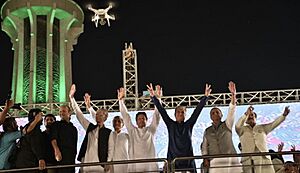
In the 2018 Pakistani general election, PTI ran a campaign against corruption. PTI gained a lot of support after its main opponent, the Pakistan Muslim League (N) (PML-N), faced major corruption claims. PTI won the most seats in the National Assembly. They also won a large majority in Khyber Pakhtunkhwa again and the most seats in Punjab to form a government. PTI won 116 out of 270 seats. Other parties claimed there was major vote rigging.
When PTI took office, it changed the usual two-party system of the PPP and PML-N. In May 2018, PTI announced a plan for its first 100 days in government. This plan included big changes in many areas, like creating a new province in Southern Punjab. PTI said its goal was to build Pakistan into a caring state, based on the ideas of the first Islamic state of Medina.
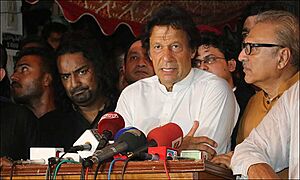
On August 6, 2018, PTI officially nominated Imran Khan as the candidate for prime minister. After the election, PTI formed a government with several other parties. Imran Khan and PTI made important appointments for national and provincial offices. Key party leaders like Asad Umar and Shah Mahmood Qureshi were given top ministries. Mahmood Khan became Chief Minister of Khyber Pakhtunkhwa. Imran Khan nominated Usman Buzdar for Chief Minister of Punjab. This choice caused some disagreements within the party.
During its time in the federal government, PTI faced some challenges within the party and with other political groups. Some ministers had to step down due to corruption claims. Top ministers in the Khyber Pakhtunkhwa cabinet were also removed by Imran Khan for going against party rules. Relations with the Pakistan Armed Forces also became difficult in 2022. The PTI government was criticized for slow economic growth during the COVID-19 Pandemic. However, it was praised for managing the pandemic and for economic recovery later on. The PTI government also started programs to help people in need, like the Ehsaas Programme. The government was removed from power in April 2022 after a vote of no-confidence.
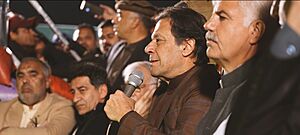
Protests for "Real Freedom" in 2022
After his government was removed in 2022, Imran Khan started a series of protests called the "Azadi March" (Freedom March). These protests were against the new government. On May 24, 2022, Khan announced a long march towards Islamabad. He led the march from Peshawar, while other PTI members led from Lahore. Imran Khan asked people to gather in Islamabad to demand early elections. He told his supporters they would stay in Islamabad until a date for fair elections was announced. He also asked the police and army to remain neutral. It was expected that about 2 million people would join the protest.
Imran Khan called this movement "Haqeeqi Azadi," meaning "Real Freedom." The second Azadi March began on October 28, 2022, from Lahore and aimed to end in Islamabad with a sit-in. During this march, there was an attempt to harm Imran Khan. Khan then decided to push for the provincial assemblies in Punjab and Khyber Pakhtunkhwa to be dissolved. This was to force early national elections instead of continuing the march.
New Members and Alliances
In a new phase of growth, PTI welcomed Parvez Elahi, Moonis Elahi, and ten former members of the Pakistan Muslim League (Q) (PML(Q)) into the party. This happened after disagreements within the PML(Q). On March 7, 2023, Parvez Elahi became the President of PTI.
On March 19, 2023, Ijaz-ul-Haq, the leader of the Pakistan Muslim League (Z) (PML(Z)), joined PTI with his party members. The PML(Z) was also merged into PTI. However, Ijaz later said that PML-Z was not merged into PTI.
May 9 Events and Aftermath
On May 9, 2023, after Imran Khan was arrested, PTI supporters held protests across the country. These protests turned into violent riots. There were incidents of damage to government and military buildings. Police claimed that Imran Khan and other PTI leaders encouraged attacks on certain places. PTI denied these claims. They said the May 9 events were a "false flag operation" designed to harm their party.
A court order later said that Imran Khan had planned attacks on military buildings and government property. The order mentioned a meeting where Khan allegedly told PTI leaders to prepare for unrest if he was arrested. However, the Lahore High Court stated that there was no evidence to prove Khan was behind the attacks. In 2024, Khan supported an investigation into the May 9 events, asking for CCTV footage to identify those responsible.
After the riots, the government took action against PTI leaders and workers. Thousands were arrested. Human rights groups raised concerns about these arrests and alleged mistreatment. PTI said its members were harassed and unlawfully arrested. Some PTI leaders were forced to leave the party. Businesses of leaders who did not quit were closed.
Changes in Leadership
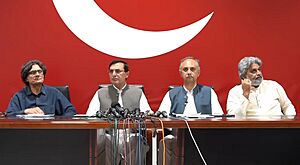
Many PTI leaders resigned after the May 9 protests. With Imran Khan and other top leaders in prison, PTI needed new leadership for the 2024 elections. Gohar Ali Khan was elected as chairman, and Omar Ayub Khan was chosen as the candidate for Prime Minister on behalf of PTI. Imran Khan remained a symbolic leader for the party.
On February 20, 2024, PTI announced an alliance with the Sunni Ittehad Council (SIC) and Majlis Wahdat-e-Muslimeen (MWM). This was to claim their share of reserved seats in the national and provincial assemblies. Both allied leaders said their support for PTI was "unconditional."
What PTI Stands For
PTI's main goal is to make Pakistan an "Islamic welfare state." This means a country where everyone is treated equally, based on the ideas of the first Islamic state of Medina. PTI plans to create programs to reduce poverty, improve healthcare, and reform the education system.
Ideas for Pakistan
PTI has suggested that Pakistan's military should be controlled by civilians. They also said that the Inter-Services Intelligence (ISI) should report directly to the Prime Minister. Imran Khan promised to resign if any terrorism came from Pakistani soil after these changes. PTI also protested against drone attacks in Pakistan. They asked the government to stop U.S. drone attacks and block NATO supplies to Afghanistan.
PTI also cares about religious tolerance and better representation for minorities. They promised to stop police brutality, change the civil service, and make the justice system truly independent. They also want to give more power to local governments. In 2013, PTI launched its education plan. They wanted to create a single education system with one curriculum in three languages for all primary schools in Pakistan. PTI also supports making South Punjab and Gilgit Baltistan formal provinces of Pakistan.
In the 2018 election, Imran Khan promised to bring a "Naya Pakistan" (New Pakistan). After forming the government, PTI faced criticism for not keeping some of its promises.
Foreign Policy Ideas
PTI wants Pakistan to have a relationship with the US based on "self-dignity and respect." They also promised to stop all foreign aid to Pakistan. Imran Khan said that having good relations with the US, Russia, and China is important for Pakistan. PTI also promised to make the Kashmir issue a top priority. They want to solve this issue permanently so Pakistan has no border disputes with its neighbors.
How PTI is Organized
Party Leadership
The National Council is the main governing body of PTI. Its members include leaders from provincial, regional, and district organizations. It also includes members nominated from different groups like women, youth, students, and minorities. The National Council is responsible for electing central leaders.
Internal Elections
In March 2012, PTI announced plans to hold internal elections, similar to those in the US. This was to choose local leaders across the country. These elections started in October 2012 and finished in March 2013. Over four million registered members took part. PTI was the first political party in Pakistan to hold such a large internal election. New internal elections were held on December 2, 2023, but were later cancelled by the Election Commission of Pakistan. The party held another internal election on March 3, 2024.
- Main Leaders
| Office | Incumbent | Term began |
|---|---|---|
| Chairman | Gohar Ali Khan | 3 March 2024 |
| Vice Chairman | Shah Mahmood Qureshi | 3 December 2011 |
| President | Parvez Elahi | 7 March 2023 |
| Senior Vice President | Vacant | |
| Senior Vice President | ||
| Senior Vice President | ||
| Senior Vice President | ||
| Secretary General | Salman Akram Raja | 7 September 2024 |
| Deputy Secretary General | Vacant | |
| Deputy Secretary General | ||
| Deputy Secretary General | ||
| Deputy Secretary General | ||
| Central Joint Secretary | ||
| Central Joint Secretary | ||
| Central Joint Secretary | ||
| Central Joint Secretary | ||
| Central Joint Secretary | ||
| Central Joint Secretary | ||
| Central Joint Secretary | ||
| Central Joint Secretary | ||
| Central Information Secretary | Sheikh Waqas Akram | 26 September 2024 |
Most of PTI's main leaders are elected. The Secretary of Information, Secretary of Finance, and other secretaries are chosen by the chairman and approved by the main committee.
- Provincial Leaders
| Designation | Name | Election Date |
|---|---|---|
| President of Punjab | Hammad Azhar | 16 December 2023 |
| General Secretary of Punjab | 4 June 2022 | |
| President of Khyber Pakhtunkhwa | Junaid Akbar | 25 January 2025 |
| General Secretary of Khyber Pakhtunkhwa | Ali Asghar Khan | 3 March 2024 |
| President of Sindh | Haleem Adil Sheikh | 3 March 2024 |
| General Secretary of Sindh | Ali Palh | 3 March 2024 |
| President of Balochistan | Dawood Shah Kakar | 3 March 2024 |
| General Secretary of Balochistan |
Party Groups
- Central Training Council (CTC)
In June 2014, a Central Training Council was created. This group trains party members on the party's ideas, how to run election campaigns, and other important tasks.
- PTI Women Wing
| Designation | Name | Ref. |
|---|---|---|
| President | Kanwal Shauzab | |
| Senior Vice President | Vacant | |
| Vice President of Khyber Pakhtunkhwa | ||
| Vice President of Balochistan | ||
| Vice President of Sindh | ||
| Vice President of Punjab | ||
| President of Central Punjab | Shahnaz Tariq | |
| General Secretary | Rubina Shaheen |
- Insaf Student Federation (ISF)
The Insaf Student Federation (ISF) is the official student group of Pakistan Tehreek-e-Insaf.
- Insaf Youth Wing
Pakistan Tehreek-e-Insaf also has a youth group. It aims to help young people under 40 with their concerns and challenges.
- People with Disabilities
On March 18, 2013, PTI announced a plan for people with disabilities. The goal was to help them be included in society. The KPK government led by PTI approved money to provide help to people with disabilities in hospitals.
- Insaf Research Wing
The Insaf Research Wing (IRW) was set up to study and find solutions for problems in Pakistan. It was founded in 2009 and covers topics like society, politics, technology, economy, and education. It has nine committees. The IRW has since been replaced by the Insaf Research Team.
Party Membership Rules
PTI party membership can be stopped or taken away if someone breaks party rules. Usually, the person is warned first. If their explanation is not good enough, their membership can be ended.
In 2016, Mufti Abdul Qawi's membership was stopped and he was later removed from the party. This happened after a disagreement involving photos he took with a model.
In 2018, Hamid Khan's party membership was stopped. He was accused of "harming" the party.
In February 2021, Liaquat Ali Jatoi was warned after he made claims of corruption against party leaders. In March 2021, Aslam Abro and Shahryar Shar were removed from the party for breaking rules. They were accused of voting against the party's candidates.
In October 2022, Faisal Vawda's party membership was ended after a controversial press conference.
In July 2023, PTI ended the membership of twenty-two lawmakers and party members from Khyber Pakhtunkhwa. This included former Chief Minister Mahmood Khan. On August 2, 2023, PTI ended the membership of twenty-two party leaders from South Punjab. This included former Chief Minister of Punjab, Usman Buzdar. On August 3, 2023, thirteen more PTI members were removed for breaking party rules. On August 8, 2023, Dewan Sachanand was removed from PTI for voting against party rules.
In December 2024, Salman Ahmad, a long-time member, was removed for saying negative things about Bushra Bibi. In February 2025, Imran Khan ordered the removal of lawmaker Sher Afzal Marwat for repeatedly breaking party rules.
Election Results
PTI has taken part in many elections in Pakistan.
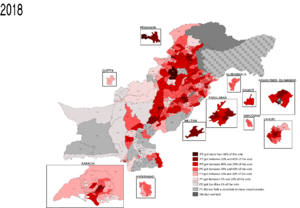
15th National Assembly (2018)
|
| Election | Leader | Votes | Seats | Position | Result | ||
|---|---|---|---|---|---|---|---|
| # | % | # | ± | ||||
| 1997 | Imran Khan | 314,820 | 1.61 |
0 / 237
|
none | Extraparliamentary | |
| 2002 | 242,472 | 0.83 |
1 / 342
|
10th | In opposition | ||
| 2008 | Did not contest | ||||||
| 2013 | 7,679,954 | 16.92 |
35 / 342
|
3rd | In opposition | ||
| 2018 | 16,903,702 | 31.92 |
149 / 342
|
1st | In government (till 11 April 2022) | ||
| Opposition (from 11 April 2022) | |||||||
| Election | Leader | Votes | Seates | Position | +/– | Result |
|---|---|---|---|---|---|---|
| 2015 | Mohsin Aziz | - |
9 / 104
|
4th | In Opposition | |
| 2018 | Azam Khan Swati Shibli Faraz Shahzad Waseem |
- |
15 / 104
|
3rd | In Opposition | |
| 2021 | Shahzad Waseem | – |
26 / 100
|
1st | In Government | |
| 2024 | Shibli Faraz | – |
17 / 96
|
3rd | Opposition |
| Election | Leader | Votes | Seats | Position | Resulting government | ||
|---|---|---|---|---|---|---|---|
| # | % | # | ± | ||||
| 2013 | Ghulam Sarwar Khan | 4,951,216 | 17.76 |
30 / 371
|
2nd | PML (N) majority | |
| 2018 | Sardar Usman Buzdar | 11,141,139 | 33.65 |
179 / 371
|
1st | PTI coalition (till 30 April 2022) | |
| PML (N) coalition (from 30 April 2022 till 27 July 2022) | |||||||
| PTI coalition (from 27 July 2022) | |||||||
| Election | Leader | Votes | Seats | Position | Resulting government | ||
|---|---|---|---|---|---|---|---|
| # | % | # | ± | ||||
| 2013 | Pervez Khattak | 1,039,719 | 19.31 |
61 / 124
|
1st | PTI coalition | |
| 2018 + 2019 (ex-FATA Elections) |
Mahmood Khan | 2,314,387 | 35.32 |
94 / 145
|
1st | PTI majority | |
| Election | Leader | Votes | Seats | Position | Resulting government | ||
|---|---|---|---|---|---|---|---|
| # | % | # | ± | ||||
| 2013 | Khurrum Sher Zaman | 609,128 | 6.08% |
4 / 168
|
4th | PPP majority | |
| 2018 | Firdous Naqvi Haleem Adil Sheikh |
1,451,132 | 14.47% |
30 / 168
|
2nd | PPP majority | |
| Election | Leader | Votes | Seats | Position | Resulting government | ||
|---|---|---|---|---|---|---|---|
| # | % | # | ± | ||||
| 2018 | Yar Muhammad Rind | 109,488 | 6.21 |
7 / 65
|
4th | BAP coalition | |
| Election | Leader | Votes | Seats | Position | Resulting government | ||
|---|---|---|---|---|---|---|---|
| # | % | # | ± | ||||
| 2015 | Raja Jahanzeb | 42,101 | 11.11% |
1 / 33
|
3rd | PML (N) Majority | |
| 2020 | Khalid Khurshid | – | – |
22 / 33
|
1st | PTI Majority | |
| Election | Leader | Votes | Seats | Position | Resulting government | ||
|---|---|---|---|---|---|---|---|
| # | % | # | ± | ||||
| 2016 | Sultan Mehmood Chaudhry | 211,827 | 12.7% |
2 / 49
|
4th | PML (N) Majority | |
| 2021 | Abdul Qayyum Khan Niazi | 613,590 | 32.5% |
32 / 53
|
1st | PTI Majority | |
Local Elections
| Electoral performance in the Khyber Pakhtunkhwa local elections (district seats) | |||
|---|---|---|---|
| Election | Seats | Position | |
| # | ± | ||
| 2015 |
395 / 1,484
|
1st | |
1997 and 2002 Elections
Less than a year after it started, PTI took part in the 1997 elections. Imran Khan ran in seven areas but did not win any of them.
In the 2002 elections, Imran Khan won one seat. PTI received a small percentage of the total votes.
2008 Elections
PTI openly decided not to take part in the 2008 elections. They believed the elections were unfair and had many problems.
2013 Elections

On April 21, 2013, Imran Khan started his campaign for the 2013 elections in Lahore. He spoke to many supporters. He also said he would take Pakistan out of the US-led war on terror. On April 22, 2013, Khan spoke at more public meetings. He announced that PTI would create a single education system for all children in Pakistan.
Khan continued his campaign across many cities and towns. He promised to end corruption and make the police system better. He also promised to get rid of old land record systems and create a new, computerized one. Khan visited over 25 towns and cities, giving many speeches. He promised to hold those responsible for the assassination of Benazir Bhutto accountable. He also said that local government systems are important for Pakistan's success.
2013 Election Results
Pakistan's 2013 elections took place on May 11, 2013. The elections resulted in a clear win for the Pakistan Muslim League (N). However, PTI became the main opposition to PML-N in Punjab Province. PTI won 20 seats in the Punjab Assembly. PTI also became the second-largest party in Karachi.
Imran Khan won three out of the four areas he ran in. PTI won 31 directly elected seats in parliament, a big increase from 2002. Nationally, PTI became the third-largest party. It was the largest party in Khyber Pakhtunkhwa and the second-largest in Punjab. In Khyber Pakhtunkhwa, PTI won against all major parties. It won every seat in Peshawar, Nowshera, and Mardan district. PTI formed a government with other parties in that province. However, PTI did not win a majority in Punjab and had limited success in Sindh or Baluchistan.
Khyber Pakhtunkhwa
In the province of Khyber Pakhtunkhwa, PTI formed a government with the Jamaat-e-Islami and Qaumi Watan parties in 2013. On May 13, 2013, Parvez Khattak became the Chief Minister of Khyber Pakhtunkhwa.
2018 Elections
Pakistan's 2018 elections took place on July 25, 2018. PTI won the most seats in the National Assembly, with 116 seats. With additional seats for women and minorities, their total reached 149. Since PTI won the most seats and votes, it formed a government at the national level. They allied with several other parties. PTI also formed governments in Khyber Pakhtunkhwa (78 seats) and Punjab (175 seats). They also joined a government in Balochistan.
After the elections, Imran Khan was elected as Prime Minister. PTI also elected its Speaker and Deputy Speaker of the National Assembly. On September 4, 2018, Arif Alvi was elected as the 13th President of Pakistan. PTI nominated Usman Buzdar as Chief Minister of Punjab and Mahmood Khan as Chief Minister of Khyber Pakhtunkhwa.
2024 Elections
Pakistan's 2024 elections took place on February 8, 2024. A government was formed by Shehbaz Sharif and PML-N. However, PTI claims that the elections were unfair. Many of PTI's leaders, including Imran Khan, were in prison before the elections. Other leaders were in hiding or had left the party. Because of this, PTI had fewer leaders to run in the elections. Gohar Ali Khan became PTI chairman, and Omar Ayub Khan was chosen as the candidate for Prime Minister.
PTI and others have claimed there was rigging before the elections. Many PTI leaders had their family members run instead because of the situation. Imran Khan was in jail during the election. PTI could not campaign much for the elections. PTI candidates had to run as independent candidates and lost their cricket bat symbol.
Despite these challenges, PTI won the largest share of votes and the second-largest share of seats. PTI claims it won the elections in Punjab and nationwide. They say that many vote counts were changed by the Election Commission of Pakistan to reduce PTI's votes. PTI claims it won a total of 180 National Assembly seats, even though it officially won 93. PTI also claims that some of its candidates won against well-known politicians, but the results were changed.
In total, PTI formed a large government in Khyber Pakhtunkhwa under Ali Amin Gandapur. It became the single largest party in the National Assembly and the largest opposition party in Punjab.
PTI's Presence in Provincial Assemblies
| Provincial assembly | Seats | Status | ||
|---|---|---|---|---|
| In government | Single largest party | Majority/coalition | ||
| AJK Legislative Assembly |
19 / 53
|
No | Yes | Opposition |
| Provincial Assembly of Balochistan |
0 / 65
|
N/A | N/A | No presence |
| Gilgit-Baltistan Legislative Assembly |
22 / 33
|
Yes | Yes | Majority |
| Provincial Assembly of Khyber Pakhtunkhwa |
58 / 145
|
Yes | Yes | Majority |
| Provincial Assembly of Punjab |
29 / 371
|
No | No | Opposition |
| Provincial Assembly of Sindh |
6 / 168
|
No | No | In Opposition |
Khyber Pakhtunkhwa
In the province of Khyber Pakhtunkhwa, PTI has led the government three times. They ruled from 2013 to 2018 under Pervez Khattak. Then from 2018 to 2023 under Chief Minister Mahmood Khan. And from 2024 until now under the Gandapur ministry.
In the 2024 Khyber Pakhtunkhwa provincial election, independent candidates supported by PTI won 86 seats. Ali Amin Gandapur was then elected as Chief Minister of Khyber Pakhtunkhwa on behalf of PTI.
Punjab
In Punjab, Pakistan's most populated province, PTI has been the largest opposition party twice. It was also the ruling party once. From 2013 to 2018, PTI was the largest opposition party. From 2018 to 2022, PTI was the largest and ruling party in Punjab, with Usman Buzdar as Chief Minister. From 2024 until now, PTI is the opposition party in the Punjab Assembly.
In the 2024 Punjab provincial election, independent candidates supported by PTI won the second-most seats. PTI claims it won the most seats without rigging. PTI nominated Mian Aslam Iqbal for Opposition Leader.
Sindh
In the southern province of Sindh, PTI was the largest opposition party once, from 2018 to 2022. PTI is currently an opposition party in Sindh since 2024. PTI-backed members won 10 seats. PTI has claimed that 38 Sindh Assembly seats were rigged against it in the 2024 Sindh provincial election.
PTI has won most of its seats in Karachi. It also has a political alliance with the Grand Democratic Alliance (GDA) against the PPP.
See also
 In Spanish: Movimiento por la Justicia de Pakistán para niños
In Spanish: Movimiento por la Justicia de Pakistán para niños
- Politics of Pakistan
- List of political parties in Pakistan
- List of student federations of Pakistan
- List of Pakistan Tehreek-e-Insaf MPs
 | Ernest Everett Just |
 | Mary Jackson |
 | Emmett Chappelle |
 | Marie Maynard Daly |


